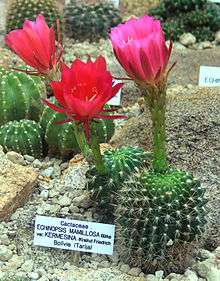Echinopsis mamillosa
Echinopsis mamillosa is a species of cactus from Bolivia.[1]
| Echinopsis mamillosa | |
|---|---|
 | |
| Growing at the Charles University Botanical Garden in Prague | |
| Scientific classification | |
| Kingdom: | Plantae |
| Clade: | Tracheophytes |
| Clade: | Angiosperms |
| Clade: | Eudicots |
| Order: | Caryophyllales |
| Family: | Cactaceae |
| Subfamily: | Cactoideae |
| Genus: | Echinopsis |
| Species: | E. mamillosa |
| Binomial name | |
| Echinopsis mamillosa Gürke | |
Description
Echinopsis mamillosa has a solitary growth habit, with globe-shaped stems up to 30 cm (12 in) tall. The stems are dark green, with a diameter of up 8 cm (3.1 in) across, and have 13–17 deep ribs, formed into tubercles. The rounded areoles are spaced up to 12 mm (0.5 in) and produce yellowish spines with brown tips, the one to four central spines being up to 10 mm (0.4 in) long and the 8–12 radial spines 5–10 mm (0.2–0.4 in) long. The flowers are white with rose tips. They are large in relation to the diameter of the stems, up to 8 cm (3.1 in) across and 13–18 cm (5.1–7.1 in) long.[1]
Two subspecies are recognized. Subspecies mamillosa is shorter (typically only up to 6 cm (2 in) tall) with 17 ribs. Subspecies silvatica is taller and has fewer ribs.[1]
Taxonomy
Echinopsis mamillosa was first described in 1907 by the German botanist Max Gürke. E. silvatica F.Ritter was included in E. mamillosa as the subspecies silvatica by Pierre Braun and E. Esteves Pereira in 1995.[1] The circumscription of Echinopsis remains controversial; the genus is accepted not to be monophyletic.[2]
References
- Anderson, Edward F. (2001), The Cactus Family, Pentland, Oregon: Timber Press, ISBN 978-0-88192-498-5, p. 273
- Nyffeler, R. & Eggli, U. (2010), "A farewell to dated ideas and concepts: molecular phylogenetics and a revised suprageneric classification of the family Cactaceae", Schumannia, 6: 109–149, doi:10.5167/uzh-43285